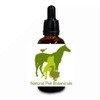

Joint Comfort Support

Joint Comfort Support
Educational Overview
Joint Comfort Support
Muscle tears, ligament or cartilage injuries, and shoulder‑related strains can occur in active pets or those that make sudden, awkward movements. Signs may include limping, stiffness, reduced willingness to play, or sensitivity when the affected area is touched. Because these signs can overlap with fractures, joint disease, or neurological issues, any persistent lameness should be evaluated by a veterinarian.
Supporting recovery often involves controlled rest, avoiding high‑impact activity, and monitoring for changes in mobility or comfort. A veterinarian can determine the specific structure involved and recommend an appropriate plan based on the individual pet’s needs.
* Natural pet botanicals are not intended to replace veterinary care or medication. Our formulas are offered as an alternative health support for your animal's condition and not as a cure. All our oral supplements are to be consumed voluntarily by your animal in food, treats or liquid.
SET OF
Educational Purposes
Joint health is an important part of maintaining mobility, strength, and quality of life in pets and performance animals. As pets age, or after periods of strain or injury, joints may benefit from extra natural support to help them stay comfortable and flexible.
This carefully prepared formulation is traditionally associated with:
-
Supporting ease of movement and flexibility
-
Helping maintain comfort in joints, muscles, and connective tissues
-
Promoting balance in the body’s natural responses to everyday strain
-
Encouraging long-term vitality and resilience in active or aging animals
Complementary care may also include gentle exercise, weight management, mineral support (such as magnesium), and ensuring a nutrient-rich diet to maintain strong bones and supple joints.
Extended Guidance
If additional support is needed, this formula may be used in conjunction with other blends depending on the concern.
Other concerns may include:
-
Muscle discomfort, arthritis, MMM, or polymyositis
-
For more information see 264(A)
-
-
Bone-on-bone challenges, or panosteitis (bone inflammation)
-
For more information see 264(B)
-
-
Combination support for both bone and muscle health
-
For more information see 264(C)
-
Complementary blends may include:
-
Herbal Defender 71 Blend
-
Musculo Balance 264-A Blend
-
Bone Ease 264-B Blend
-
Bone-Musculo Balance 264-C Blend
Panosteitis
Panosteitis, sometimes called “growing pains,” is a painful inflammation of the outer surface of one or more long bones of the legs. It is most often observed in larger breed dogs during growth phases.
-
For more information see 87-A
Dogfight or Dog Attack (including cats attacked by dogs)
In the case of an attack, it is very important to begin support immediately. Repeated dosing of bleed and shock support drops (e.g. Arnica) may help stabilize the body during trauma. This is also beneficial if emergency veterinary attention is required, as it may help reduce risk of internal bleeding and shock.
Additional support options:
-
Bach Flowers “Rescue Remedy”
-
For more information see 115
-
-
Bone fractures, bladder damage, bowel prolapse, spine injury, concussion
-
For more information see 169
-
-
Nerve pain and damages, often associated with injuries
-
For more information see 158
-
-
Ligament tears
-
For more information see 90
-
In many cases, more than one remedy may be required to cover different aspects of injury. It is safe to use 1–3 remedies together to create a complete support approach.
Formulated with plant-based ingredients selected for their gentle role in supporting overall balance and wellbeing.
SET OF 1
1. Joint Comfort 190 formula
Contains:
Formula 1.
Ruta whole plant (Ruta grav 1M)
Fe-Iron (Ferrum metallicum 30C)
St. John’s Wort (Hypericum 30C)
Leopard’s Bane (Arnica 30C)
Salt of Wormwood Potassium Carbonate (Kali carb 30C)
Meadow Saffron (Colchicum 30C)
Potassium Iodide (Kali iod 30C)
Potassium Hydrate (Causticum 30C)
Oak (Rhus tox 30C)
Calcium Carbonate (Calc carb 30X)
Calcarea Phosphorica (Calcium phosphate 3C, 200C, 1M)
Gum-resin Lignum sanctum (Guaiacum officinale 200C, 1M)
in 20% USP alcohol in purified water.
Muscle & Joint Injury Support
Muscle injuries can sometimes lead to joint dislocations, ligament laxity, or other complications such as rotator cuff injuries and tendon strain. In both animals and humans, these injuries may also involve inflammation of the surrounding tissues, creating discomfort and limiting movement.
Some cases may be congenital, such as dislocations of the shoulder, while others are the result of accidents, repetitive strain, or overexertion. Strains to the joints, muscles, and tendons are common in active pets and performance animals. Even structural challenges such as scoliosis may increase vulnerability to these types of injuries.
This supportive blend is traditionally associated with:
-
Helping maintain comfort in injured muscles, ligaments, and tendons
-
Supporting natural recovery from strains, sprains, and dislocations
-
Promoting flexibility and strength in connective tissues
-
Encouraging resilience and balance in overall musculoskeletal health
Complementary support may also include gentle physical rehabilitation, rest, massage therapies, and mineral support such as magnesium to relax and nourish muscle tissues.
✨ For educational purposes only.
Need more advice or have more questions? Contact us for a FREE consultation with one of our fully qualified practitioners.
These statements are for general wellbeing and educational purposes only. This product is not intended to diagnose, treat, or prevent any disease. Always seek veterinary or professional advice for specific health concerns.
DISCLAIMER
The statements made regarding these products have not been evaluated by the Food and Drug Administration. The efficacy of these products has not been confirmed by FDA-approved research. These products are not intended to diagnose, treat, cure or prevent any disease. All information presented here is not meant as a substitute for or alternative to information from your health care practitioners. The Federal Food, Drug, and Cosmetic Act require this notice.
Educational Overview
Joint Comfort Support
Muscle tears, ligament or cartilage injuries, and shoulder‑related strains can occur in active pets or those that make sudden, awkward movements. Signs may include limping, stiffness, reduced willingness to play, or sensitivity when the affected area is touched. Because these signs can overlap with fractures, joint disease, or neurological issues, any persistent lameness should be evaluated by a veterinarian.
Supporting recovery often involves controlled rest, avoiding high‑impact activity, and monitoring for changes in mobility or comfort. A veterinarian can determine the specific structure involved and recommend an appropriate plan based on the individual pet’s needs.
* Natural pet botanicals are not intended to replace veterinary care or medication. Our formulas are offered as an alternative health support for your animal's condition and not as a cure. All our oral supplements are to be consumed voluntarily by your animal in food, treats or liquid.
SET OF
Educational Purposes
Joint health is an important part of maintaining mobility, strength, and quality of life in pets and performance animals. As pets age, or after periods of strain or injury, joints may benefit from extra natural support to help them stay comfortable and flexible.
This carefully prepared formulation is traditionally associated with:
-
Supporting ease of movement and flexibility
-
Helping maintain comfort in joints, muscles, and connective tissues
-
Promoting balance in the body’s natural responses to everyday strain
-
Encouraging long-term vitality and resilience in active or aging animals
Complementary care may also include gentle exercise, weight management, mineral support (such as magnesium), and ensuring a nutrient-rich diet to maintain strong bones and supple joints.
Extended Guidance
If additional support is needed, this formula may be used in conjunction with other blends depending on the concern.
Other concerns may include:
-
Muscle discomfort, arthritis, MMM, or polymyositis
-
For more information see 264(A)
-
-
Bone-on-bone challenges, or panosteitis (bone inflammation)
-
For more information see 264(B)
-
-
Combination support for both bone and muscle health
-
For more information see 264(C)
-
Complementary blends may include:
-
Herbal Defender 71 Blend
-
Musculo Balance 264-A Blend
-
Bone Ease 264-B Blend
-
Bone-Musculo Balance 264-C Blend
Panosteitis
Panosteitis, sometimes called “growing pains,” is a painful inflammation of the outer surface of one or more long bones of the legs. It is most often observed in larger breed dogs during growth phases.
-
For more information see 87-A
Dogfight or Dog Attack (including cats attacked by dogs)
In the case of an attack, it is very important to begin support immediately. Repeated dosing of bleed and shock support drops (e.g. Arnica) may help stabilize the body during trauma. This is also beneficial if emergency veterinary attention is required, as it may help reduce risk of internal bleeding and shock.
Additional support options:
-
Bach Flowers “Rescue Remedy”
-
For more information see 115
-
-
Bone fractures, bladder damage, bowel prolapse, spine injury, concussion
-
For more information see 169
-
-
Nerve pain and damages, often associated with injuries
-
For more information see 158
-
-
Ligament tears
-
For more information see 90
-
In many cases, more than one remedy may be required to cover different aspects of injury. It is safe to use 1–3 remedies together to create a complete support approach.
Formulated with plant-based ingredients selected for their gentle role in supporting overall balance and wellbeing.
SET OF 1
1. Joint Comfort 190 formula
Contains:
Formula 1.
Ruta whole plant (Ruta grav 1M)
Fe-Iron (Ferrum metallicum 30C)
St. John’s Wort (Hypericum 30C)
Leopard’s Bane (Arnica 30C)
Salt of Wormwood Potassium Carbonate (Kali carb 30C)
Meadow Saffron (Colchicum 30C)
Potassium Iodide (Kali iod 30C)
Potassium Hydrate (Causticum 30C)
Oak (Rhus tox 30C)
Calcium Carbonate (Calc carb 30X)
Calcarea Phosphorica (Calcium phosphate 3C, 200C, 1M)
Gum-resin Lignum sanctum (Guaiacum officinale 200C, 1M)
in 20% USP alcohol in purified water.
Muscle & Joint Injury Support
Muscle injuries can sometimes lead to joint dislocations, ligament laxity, or other complications such as rotator cuff injuries and tendon strain. In both animals and humans, these injuries may also involve inflammation of the surrounding tissues, creating discomfort and limiting movement.
Some cases may be congenital, such as dislocations of the shoulder, while others are the result of accidents, repetitive strain, or overexertion. Strains to the joints, muscles, and tendons are common in active pets and performance animals. Even structural challenges such as scoliosis may increase vulnerability to these types of injuries.
This supportive blend is traditionally associated with:
-
Helping maintain comfort in injured muscles, ligaments, and tendons
-
Supporting natural recovery from strains, sprains, and dislocations
-
Promoting flexibility and strength in connective tissues
-
Encouraging resilience and balance in overall musculoskeletal health
Complementary support may also include gentle physical rehabilitation, rest, massage therapies, and mineral support such as magnesium to relax and nourish muscle tissues.
✨ For educational purposes only.
Need more advice or have more questions? Contact us for a FREE consultation with one of our fully qualified practitioners.
These statements are for general wellbeing and educational purposes only. This product is not intended to diagnose, treat, or prevent any disease. Always seek veterinary or professional advice for specific health concerns.
DISCLAIMER
The statements made regarding these products have not been evaluated by the Food and Drug Administration. The efficacy of these products has not been confirmed by FDA-approved research. These products are not intended to diagnose, treat, cure or prevent any disease. All information presented here is not meant as a substitute for or alternative to information from your health care practitioners. The Federal Food, Drug, and Cosmetic Act require this notice.
Related Products


Arthritis Mobility Support
(1)

Bone Fractures

Ligament & Joint Health Support
(26)
Available for purchase after consultation with a practitioner.
Available for purchase after
consultation with a practitioner.
Become a member, It’s free.

Joint Swelling Awareness

Magnesium liquid (Magnesium Chloride) (284)
(6)






